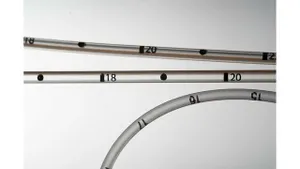Commonsense regulations may be coming to Washington
Manufacturers face overwhelming costs associated with the need to comply with government regulations, and the plastics industry is no exception, writes the Plastics Industry Association. Relief may be on the way.
June 20, 2017

 For far too long, federal regulatory agencies have been allowed to run amok with regulations that make little sense and harm the U.S. economy. Finally, some common sense may be coming to Washington. And manufacturing/plastics industry trade associations are taking note.
For far too long, federal regulatory agencies have been allowed to run amok with regulations that make little sense and harm the U.S. economy. Finally, some common sense may be coming to Washington. And manufacturing/plastics industry trade associations are taking note.
In April, the National Association of Manufacturers (NAM; Washington, DC), which describes itself as the nation’s largest manufacturing trade association, “unveiled a digital and print ad campaign thanking President Donald Trump for the commitment to manufacturers by addressing our nation’s regulatory burden head on during his first 100 days in office.”
NAM CEO Jay Timmons remarked, “In his first 100 days, President Trump has kept his promise to manufacturers in the United States in historic ways. That is why 93% of manufacturers surveyed by NAM are positive in their outlook on the economy—a 20-year record high. He has paved the way to reduce job-crushing regulatory burdens in America unlike any previous president. And his bold actions to promote investment and create jobs are lifting up more Americans and restoring confidence to those who have felt left behind.”
The six-figure ad campaign will run in major print and online publications, such as the Washington Post, Wall Street Journal and Philadelphia Inquirer, as well as on social media platforms.
In May, The Plastics Industry Association (PLASTICS; Washington, DC) applauded the Senate Homeland Security and Government Affairs Committee for introducing Senate Bill 951, the Regulatory Accountability Act of 2017 (RAA), a bipartisan measure proposed by senators Rob Portman (R-OH) and Heidi Heitkamp (D-ND).
“The plastics industry welcomes well-thought regulations, and agrees they are absolutely necessary when those regulations meet their intended goals. However, regulations should be written in a fair and open process with clear statutory authority and, further, benefit the people they are intending to protect. Manufacturers face overwhelming costs associated with the need to comply with government regulations. The plastics industry is no exception,” said a statement from PLASTICS.
The RAA will provide greater transparency in the regulatory process by starting public outreach sooner on rules with the greatest financial impact. It also provides assurances that agencies use the “best reasonable available” scientific data.
What a novel idea! These agencies continue to justify their existence by writing regulations that have nothing to do with scientific facts or data, and this is certainly a step in the right direction. At a time when the plastics industry is being hit by various activist groups demanding the elimination of plastics from the face of the earth, it doesn’t need to deal with government agencies making rules based on fake science.
The RAA also provides for a cost benefit analysis and reviews of older rules to ensure outdated and ineffective rules are removed from the books, said the PLASTICS release.
Too often these government agencies write rules willy-nilly with total disregard for the negative consequences they may have on the economy, on manufacturers and on consumers. It’s about time that government be run more like a business.
“The Regulatory Accountability Act codifies many longstanding practices, thus providing the certainty all businesses need to plan for future growth and opportunity,” said PLASTICS. “PLASTICS looks forward to supporting full consideration of the RAA in the Senate and future action in the House on this important matter.”
NAM’s Timmons commented, “These 100 days are just the beginning; there’s still a lot of work to do, and manufacturers intend to stand with the president to bring real change to America. We look forward to continuing to partner with the Trump administration and Congress to achieve tax and regulatory reform, increase investment in our nation’s infrastructure and strengthen our workforce, so that every American has a chance to succeed.”
It’s about time Washington found some common sense and began applying good, scientific methodology, so that when regulations are required—and there should be good reason for such requirements—they don’t place undue burdens on manufacturers and promote a healthy economy.
About the Author(s)
You May Also Like




